When I was a little child, my grandma had a chicken coop that housed unusual “chickens.” Those chickens were different than our usual chickens, as they had dark grey feathers speckled with white dots. These birds were guinea fowls.
My cousins and I were fascinated with guineafowls, and we would often beg our grandma to show us these birds; if we behaved well, she would gently pluck out one or two feathers and give them to us.
While the guinea fowl represents a dear childhood memory to me, this bird also has strong symbolism in certain cultures. In this text, I will tell you more about guinea fowl symbolism, not only throughout history but also in the modern age, so keep reading to learn more!
Interesting Facts About Guinea Fowls
The only way to fully understand the symbolism of some animals is to learn more about them, their appearance, and their behavior.
Habitat
Guinea fowls are native to Africa, where they inhabit Sub-saharan Africa regions. Different guinea fowl subspecies prefer different habitats, as some thrive in jungles, forests, and even treetops, while others live in savannas and semi-deserts.
Some subspecies, such as helmeted guinea fowl, were introduced to Europe, Asia, and the American continents. On those continents, guinea fowls are usually raised as a food source, but sometimes, they are kept as a pet.
Appearance
Guinea fowls have featherless heads, although some specimens have black crests. Their dark plumage is of grey or blackish color, and it is speckled with dense white spots. They have beaks similar to regular chickens.
These birds are relatively large, having 15–28″ (40–71 cm) long bodies and weighing 1 lb 9 oz – 3 lb 8 oz (0,7–1,6 kg) on average. Females are called guinea hens, and they are usually larger than the males (guinea cocks).
Reproduction
Like other birds, guinea fowls lay eggs. They are monogamous animals and usually lay between 8 and 15 eggs, which hatch after 24 to 30 days. Males will help their partners guard the nest. The guinea fowl chickens are known as keets, and they will become independent from their parents after two months.
Other Guinea Fowl Facts
Guinea fowls feed on various insects, bugs, snakes, ticks, fleas, beetles, crickets, worms, grasshoppers, and spiders. While eating all these animals, guinea fowls are doing a great job as pest control on farms and backyards. They are also known as a great way to keep the foxes away.
Guinea fowls are ground-dwelling animals that spend most of their days on the ground looking for various insects to eat, but they will also eat plant-based foods, such as berries, seeds, grains, roots, etc.
A study conducted in 2019 showed that guinea fowls were capable of living in harmony not only with members of their own flock but also with multiple other flocks of different bird species. This makes guinea fowls perfect addition to any domestic setting.
Guinea Fowl Symbolism In Different Cultures
Since guinea fowls are known to be great pest exterminators, they are often a symbol of protection. They are also representing courage, fertility, mother love, protecting loved ones and taking care of them, etc.
Another way to interpret guinea fowl symbols is to see them as signs of medicine and healing, as guinea fowls protect the health of other animals and even people by eating dangerous pests.
Guinea fowls had an important place in many African cultures but also in some European myths.
Sub-Saharan Africa
Sub-saharan African tribes connected guinea fowls to many different meanings. They saw the guinea fowl as a symbol of resilience, hard work, endurance, productivity, justice, cooperation, companionship, and generally as a bringer of good fortune to the homestead.
However, some tribes in East Africa believed it was a bad omen to have a guinea fowl cross your path if you are going to a funeral.
The Myth About Pitipiti and Guinea Fowl
One Zimbabwean myth shows a guinea fowl as a cunning trickster that rewards hard-working and good people and punishes the lazy and cruel. It tells us the story of woman Pitipiti, who was a loyal, honest, and hard-working wife to he husband, but she couldn’t bear him any children.
Pitipiti’s husband found a second wife who quickly gave him children but soon proved to be cruel towards Pitipiti. One day, as she was working in the field, one guinea fowl asked Pitipiti if she would adopt him as her son.
She accepts, but only if it is kept a secret. As he sees the second wife treating Pitipiti very badly, he summons other guinea fowls, and they eat the second’s wife crops. As punishment, the Pitipiti’s husband and his second wife kill and eat the guinea fowl.
Soon after, they begin to hear the guinea fowl’s song from their bellies. In a panic, they cut out their bellies, and the guinea fowl emerges unharmed. The husband and the second wife die from their injuries, and many men offer to marry Pitipiti after they hear about her son’s cleverness.
The Story About Guinea Fowl Getting Its Spots
One Swahili tale tells us a story about the friendship between a guinea fowl and a cow. Both animals had the same enemy: the lion. The cow would keep an eye on their surroundings while the guinea fowl ate, and the guinea fowl would do the same in return when the cow was eating.
As a sign of gratitude, the cow splashed several drops of her milk onto the guinea fowl, helping it camouflage better. These milk drops became white spots on the guinea fowl’s plumage.
Ancient Egypt
The guinea fowls were domesticated by the ancient Egyptians. The hieroglyphs and pictures depicting this bird were found on the walls of the Painted Tomb at Hierakonpolis. Ancient Egyptians saw the guinea fowl as a symbol of the soul.
Ancient Greece
Ancient Greeks were familiar with helmeted guinea fowls and kept them as domestic animals. Guinea fowls were often associated with the Greek goddess Artemis, the goddess of hunting, nature, chastity, moon, and wild animals.
One legend tells us a story about the time when the Calydonian king insulted Artemis by not offering her a proper sacrifice. As a punishment, Artemis sent a bear, known as the Calydonian bear, to kill and scare Calydonian residents.
The bear couldn’t be killed for a long time until it was finally killed by a heroic hunter Meleager. Soon the Calydonian people started to fight among each other and against other tribes in an effort to possess the bear’s skin.
During this bloody war, Meleager killed his own uncles, which prompted his mother to curse him to death. When he died, his sisters wept without stopping, and Artemis felt sorry for them, so she transformed them into guinea fowls, placed them on the island of Leros, and forbade her followers to eat them.
Christianity
Although guinea fowls aren’t mentioned explicitly in the Bible, the bible depicts fowls (all birds) as a symbol of fertility, prosperity, balance, and the blessings found in nature.
Guinea Fowl Symbolism In the Modern Age
Guinea fowls have a similar symbolism even in the modern age. These birds represent fertility, abundance, new beginnings, renewal, good luck, protection, care, and mother’s love.
Guinea Fowl Spirits And Their Significance
Guinea fowls can be your power animal, spirit animal, or totem animal.
- Guinea Fowl Power Animal: If your power animal is guinea fowl, you are probably someone who takes care of their loved ones and protects them from danger. You like to contribute to the common good, and people see you as a team player.
- Guinea fowl Spirit Animal: As a spirit animal, the Guinea fowl will teach you to be more cautious and alert to any danger. It will also remind you to be resilient and never give up. When you are in a bad phase of your life, guinea fowl reminds you that good times are waiting for you.
- Guinea fowl Totem Animal: Having a guinea fowl as your totem animal means that you are an outgoing person that enjoys other people’s company and acts protectively when it comes to their family and friends. You have a strong intuition and feel a strong connection to nature, and you can also have natural healing powers.
The Symbolism Behind Guinea Fowl Tattoos
If you want a tattoo that will represent good luck, fertility, and prosperity, that will also protect you from evil, you should get the guinea fowl tattoo. Also, this tattoo can represent your strong connection to nature.
What Does a Guinea Fowl Dream Mean?
Dreams with guinea fowls are considered to be good omens. These dreams usually represent that something good is going to happen to you very soon.
Also, dreaming about guinea fowl can mean that you need to stick up for yourself or that you are forgetting something important. If you dream about eating a guinea fowl, you will soon be faced with a financial opportunity.
Final Words
Guinea fowls are fierce and protective animals, which made them a symbol of protection, caring, and resilience, as well as the symbol of healing, abundance, fertility, and riches.
Many African tribes revered this animal, and even today, it is seen as a useful animal and great pet.
What do you think about Guinea fowls and their symbolism? Could you picture a guinea fowl as your spirit, power, or totem animal? Write in the comments!
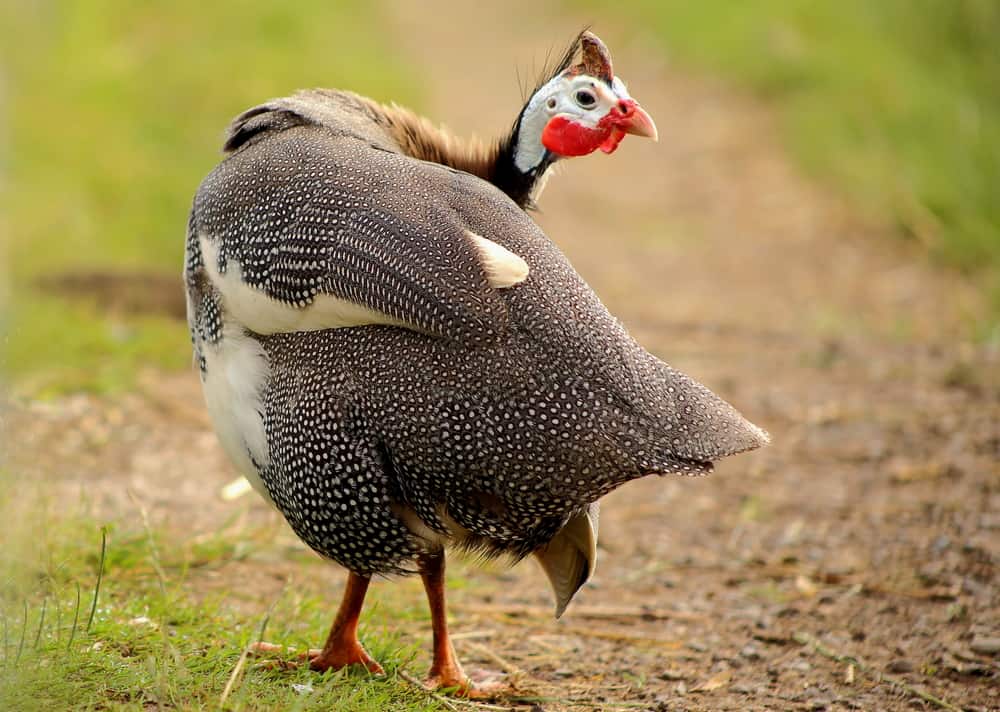
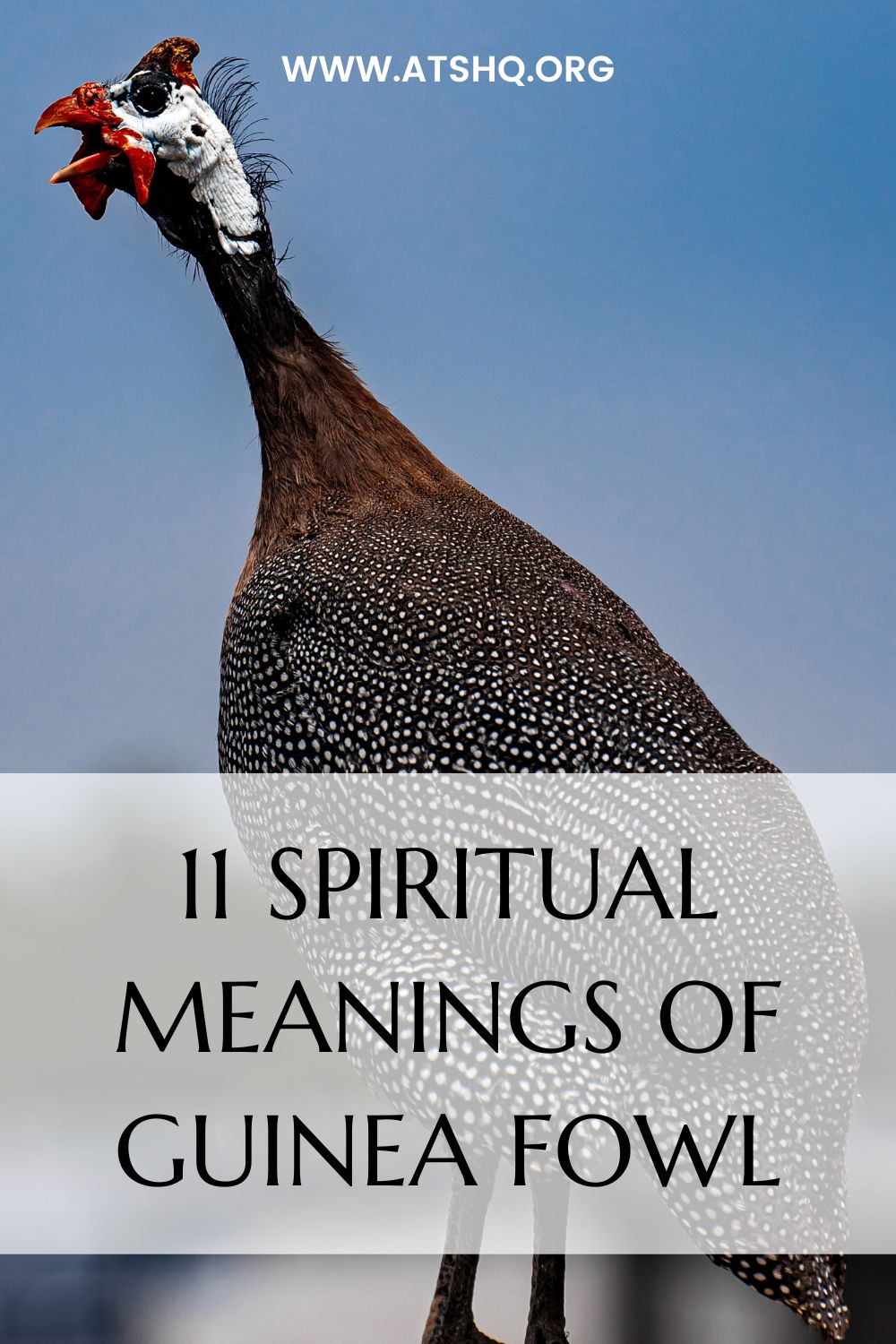
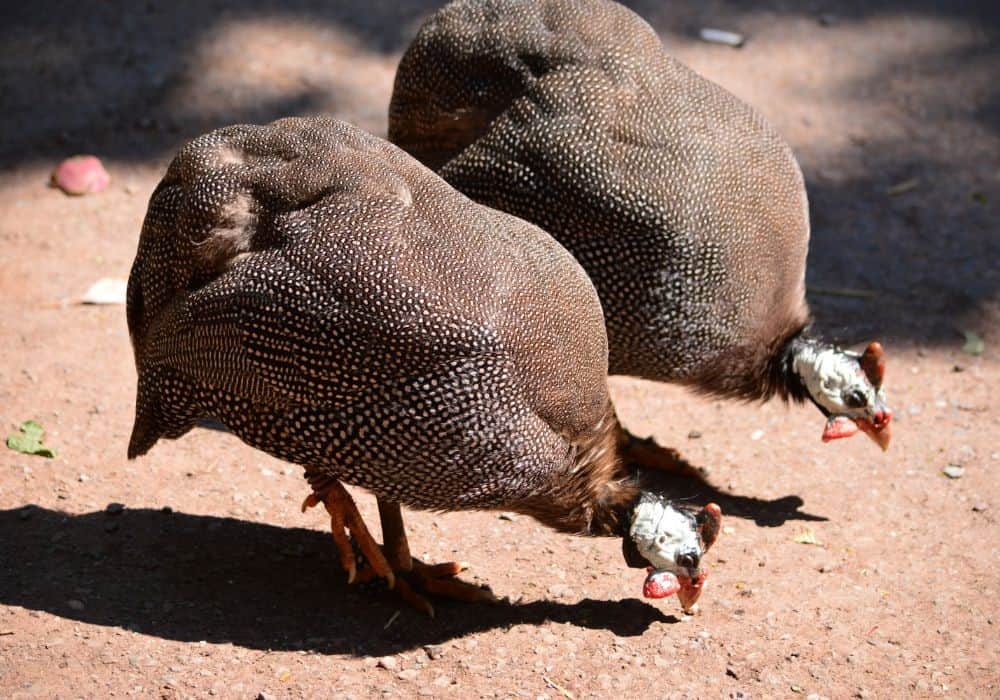
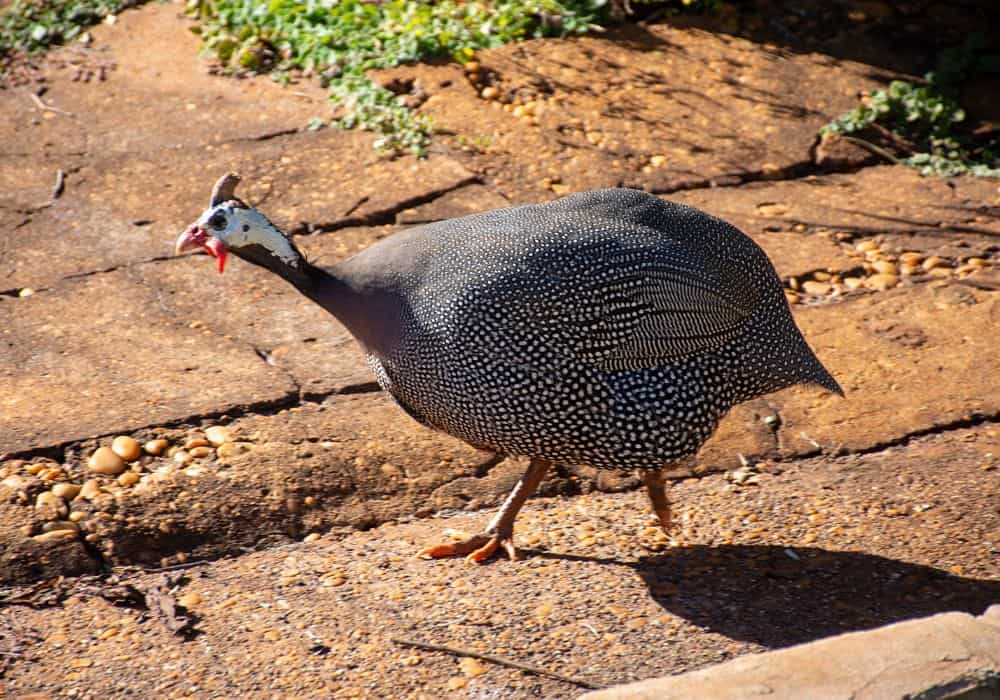
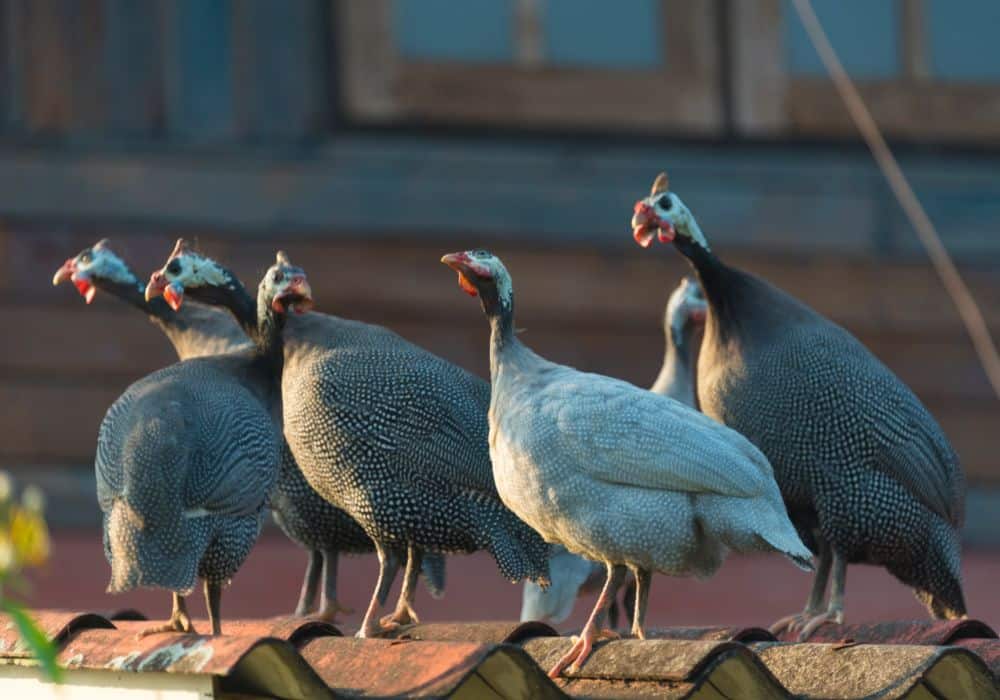
It appears at my home while i was talking spirituality
I love rearing g.fowl very lovely and briliant birds.
I was asleep and on my pillow there were 3 Guinea fowls sleeping next to my head.Thet were so beautiful and peaceful.In my dream I wanted to take a picture of them.At that time they symbolized peace and happiness. I must say also that I am mourning my dear cousin who died a few days ago.He was very ill.
I like realing them but they never stake me as a business prodection.
Now i had the dream i will start realing them again